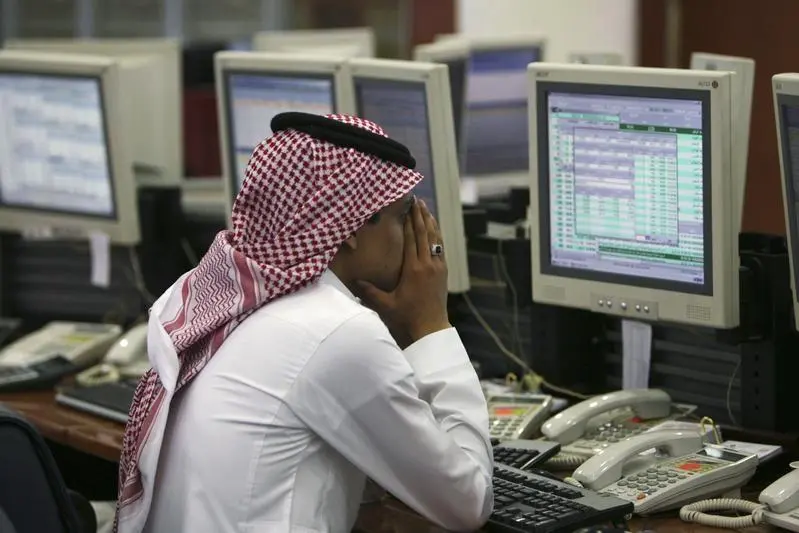PHOTO
DUBAI - Higher oil prices helped Saudi Arabia's stock market to offset some of this week's losses on Thursday, though other Gulf markets were down as geopolitical concerns continued to weigh on investors in the region.
Trading activity was also slow because of the Muslim fasting month of Ramadan, traders said.
The Saudi index gained 0.7 percent as Brent crude futures LCOc1 hit $80 a barrel for the first time since November 2014 on concerns Iranian exports could fall, reducing supply in an already tightening market.
The prospects of a sharp drop in Iranian oil exports in the coming months due to renewed U.S. sanctions have been good to oil prices, but they also raise concerns of instability in an already conflict-torn region.
Foreign investors have been selling Saudi Arabian equities, exchange data showed, partly because of geopolitical tensions since U.S. President Donald Trump said he was pulling out of the Iran nuclear deal.
Shares in the energy and petrochemical sectors rose in Saudi Arabia, led by companies with big capitalisations including Saudi Basic Industries (SABIC) which gained 1.3 percent and Saudi Kayan Petrochemical Company 2350.SE which rose 1.2 percent. National Petrochemical Co was up 1.5 percent.
Shares of Saudi Arabia's Alawwal Bank stayed on a positive trend with another 0.6 percent gain to 14.00 riyals in heavy volume, after a 10 percent jump on Wednesday.
Alawwal has reached a preliminary, non-binding agreement to merge with HSBC-backed Saudi British Bank 1060.SE to create Saudi Arabia's third-biggest bank with assets of about $77 billion.
Other Saudi bank shares were mixed with the kingdom's biggest lender, National Commercial Bank 1180.SE , gaining 4.2 percent and Saudi British Bank falling by 3.3 pct to 30.88 riyals, extending losses for a second day. Alinma Bank was also up 1.1 percent.
In Abu Dhabi, real estate developers Eshraq Properties ESHR.AD and Aldar Properties were the most heavily traded shares, with Aldar giving up 0.9 percent. Dana Gas was also heavily traded but the price held steady.
Abu Dhabi's index lost 0.8 percent.
In Dubai, the index was down 0.6 percent, dragged lower by Emaar Properties and subsidiary Emaar Development , down 1.2 percent and 0.7 percent respectively. GFH Financial helped reduce the market losses and rose 2.1 percent.
In Qatar, the main index, which rose earlier this week after it was buoyed by MSCI's decision to increase the weightings of several blue chips, was also in negative territory, losing 0.7 percent.
Qatar Islamic Bank gained 0.9 percent but Masraf al Rayan MARK and telecommunications group Ooreedoo were down 2.3 percent and 1.3 percent respectively.
In Egypt, the main index was dragged down by the telecommunication sector, closing down 0.7 percent.
Global Telecom dived 2.8 percent after HSBC cut its target price to 6.1 from 7.9 Egyptian pounds, while Orascom Telecom fell 1.2 percent in heavy trade.
SAUDI ARABIA
* The indexrose 0.7 percent to 8,017 points.
DUBAI
* The index lost 0.6 percent to 2,913 points.
ABU DHABI
* The index slipped 0.8 percent to 4,432 points.
QATAR
* The index dropped 0.7 percent to 8,891 points.
KUWAIT
* The index edged down 0.2 percent to 4,766 points.
BAHRAIN
* The index was flat at 1,273 points.
OMAN
* The index shed 0.8 percent to 4,618 points.
EGYPT
* The index was down 0.7 percent to 16,878 points. ($1 = 3.7502 riyals) ($1 = 3.6730 UAE dirham)
(Reporting by Aziz El Yaakoubi; Editing by Adrian Croft) ((aziz.elyaakoubi@thomsonreuters.com; +971552994086);))





















